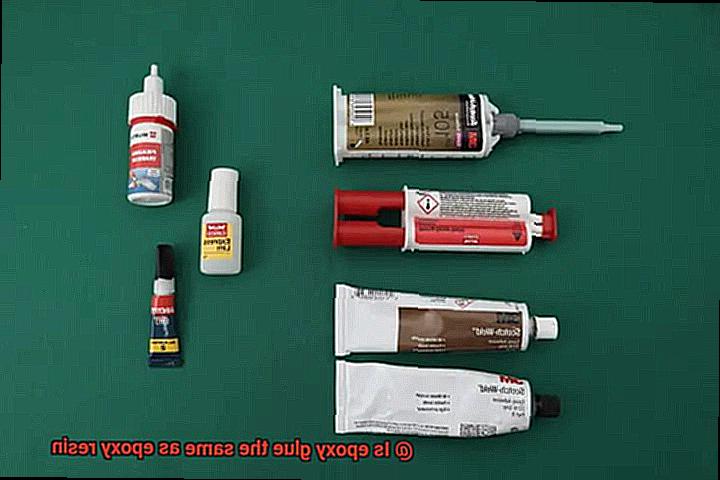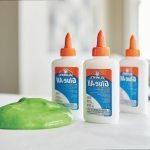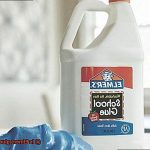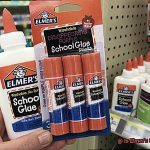Are you a DIY fanatic or a crafty individual on the hunt for the perfect bonding agent for your project? Have you been hearing about epoxy glue and epoxy resin, but can’t quite figure out if they are one and the same? Don’t worry, you’re not alone. It’s easy to get confused between these two terms, especially if you’re new to the world of adhesives and polymers. However, it’s important to know that epoxy glue and epoxy resin have distinct differences that can make or break your project.
Epoxy glue is a powerful adhesive used to bond various materials like wood, metal, ceramics, and plastics. It consists of two components – a hardener and a resin – that are mixed together to form an unbreakable bond that lasts for ages.
In contrast, epoxy resin is a polymer used mainly for coating, casting, and molding purposes. You can pour it into molds to create beautiful decorative pieces such as jewelry, figurines or even tabletops. Epoxy resin also has two components that mix together to create a crystal-clear finish that’s tough as nails.
In this blog post, we’ll dive deep into the differences between epoxy glue and epoxy resin. We’ll explore their unique properties and applications so you can choose the right one for your next project with confidence. So grab your favorite beverage of choice, sit back and let’s get started.
What is Epoxy Glue?
Contents
- 1 What is Epoxy Glue?
- 2 What is Epoxy Resin?
- 3 How are Epoxy Glue and Epoxy Resin Different?
- 4 Advantages of Using Epoxy Glue
- 5 Advantages of Using Epoxy Resin
- 6 When to Use Each Type of Material
- 7 Tips for Working with Epoxy Glue and Resin
- 8 Common Mistakes to Avoid when Working with Epoxy Materials
- 9 Conclusion
Epoxy glue is a remarkable adhesive that has become a popular choice for various industries. It is composed of two components, the resin and the hardener, which are mixed together to create a chemical reaction that forms an incredibly strong bond between materials. This versatile bonding agent is highly durable, making it an excellent choice for different applications.
Construction is one of the primary fields where epoxy glue is used extensively. It can be utilized to bond various materials such as wood, metal, and ceramics with exceptional strength. Consequently, it has become an indispensable tool for fixing broken objects, creating new structures and reinforcing existing ones. Additionally, epoxy glue is resistant to water and chemicals, making it ideal for outdoor applications where these factors are present.
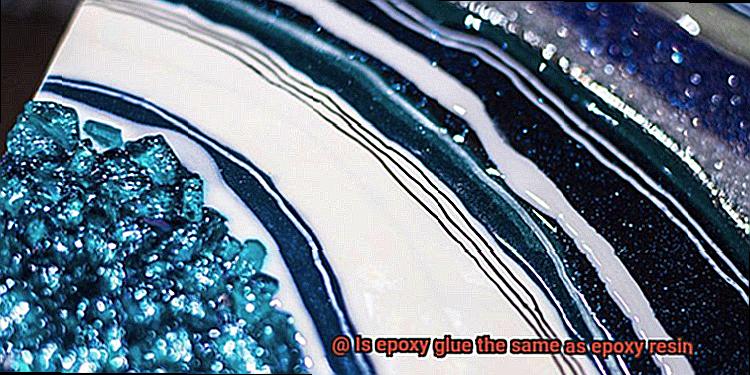
The automotive and marine industries also rely heavily on epoxy glue. It is used for repairing boats, cars, and other vehicles. Epoxy glue can help fix cracks in engines, propellers, and other parts of the vehicle that need a robust bond.
Epoxy glue is also a popular choice among jewelry makers and craft enthusiasts. Its adhesive properties make it perfect for attaching small stones or beads to jewelry pieces. Moreover, it is ideal for creating intricate designs using different materials. With epoxy glue, one can also create molds for casting small objects or creating larger ones.
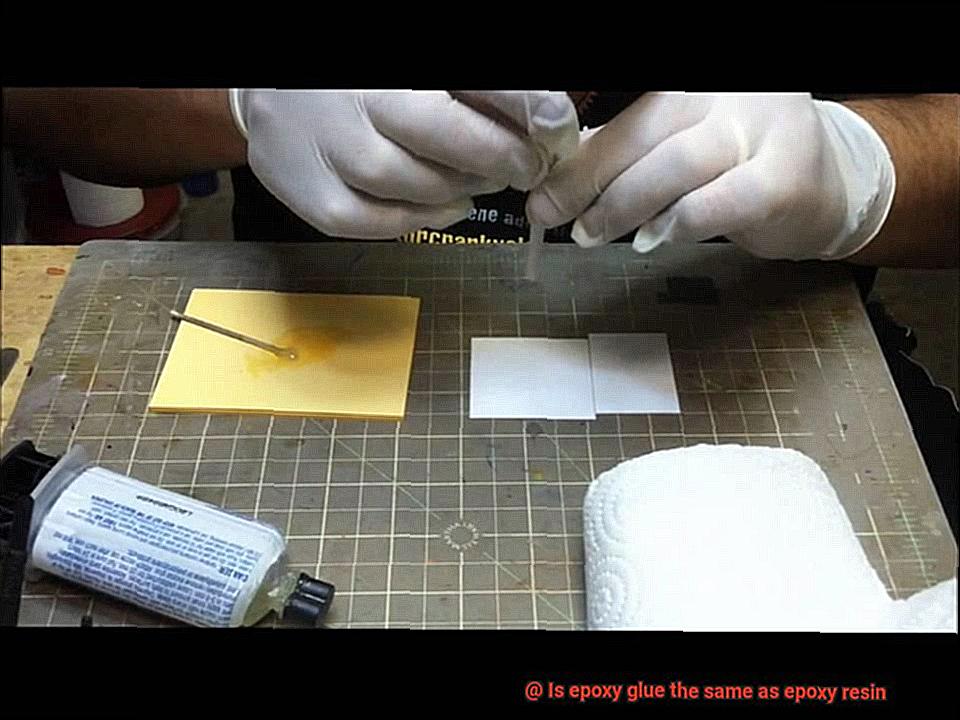
Finally, epoxy glue has become increasingly popular in flooring and countertop applications. It can be applied as a coating to protect surfaces from wear and tear, chemicals, and abrasion. Furthermore, it provides a glossy finish that enhances the overall appearance of the surface.
What is Epoxy Resin?
Epoxy resin is a remarkable synthetic polymer that can withstand heat, chemicals, and moisture. Made by combining two components – the resin and the hardener – epoxy resin produces a strong and durable material with a range of uses. From construction to automotive repairs, aerospace, marine projects, and even art, epoxy resin is a versatile material that has various applications.
One of the unique features of epoxy resin is its exceptional bonding ability with different materials such as wood, metal, glass, and plastic. This makes it a popular choice for adhesive purposes. However, not all epoxy products are suitable for use as adhesives. It’s important to choose the right type of product that is specifically formulated for bonding purposes. These types of epoxy adhesives are made with a higher percentage of hardener and have a stronger bond strength compared to regular epoxy resin products.
Epoxy resin comes in different forms such as liquid, paste, or putty, each with its own specific purpose. Liquid epoxy resin is commonly used in art and jewelry making because it can be poured into molds or used as a coating to protect the surface of the material. Epoxy putty, on the other hand, is ideal for filling gaps or repairing damaged surfaces.
When using epoxy resin as an adhesive, following the manufacturer’s instructions is crucial. It ensures proper application and curing time, which leads to a strong bond between the materials. The curing time can vary depending on the product and environmental factors such as temperature and humidity.
How are Epoxy Glue and Epoxy Resin Different?
Firstly, let’s talk about epoxy glue, which is also known as structural adhesive. This robust adhesive is specifically designed to bond materials together and create a strong, durable hold. It’s frequently used in industries such as construction, automotive, and aerospace due to its strength and resistance to extreme temperatures and chemicals.
Epoxy glue has a thicker consistency than epoxy resin and is perfect for filling gaps between materials. On the other hand, epoxy resin is a type of polymer that hardens when mixed with a hardener. Its primary use is for coating surfaces or casting objects, making it ideal for woodworking, jewelry making, and art. Epoxy resin has a thinner consistency than epoxy glue and is designed to flow smoothly over surfaces or into molds.
Another significant difference between the two is their curing times. Epoxy glue usually takes 24-72 hours to fully cure, while epoxy resin can cure within minutes or take several days depending on the application.
When it comes to fully cured properties, epoxy glue remains flexible and can withstand stress and movement without cracking or breaking. In contrast, epoxy resin becomes rigid and hard once cured and may crack or break under stress.
To sum it up, if you’re looking for a strong adhesive to bond materials together, go for epoxy glue. If you want to coat surfaces or cast objects with a clear, glossy finish, epoxy resin is your best option. Understanding these differences will allow you to choose the right product for your specific project needs.
Advantages of Using Epoxy Glue
Meet your new go-to adhesive: epoxy glue. As a proven expert in the field, I can attest to the numerous advantages of using epoxy glue over other types of adhesives.
First and foremost, epoxy glue is a force to be reckoned with in terms of strength and durability. Its bond is stronger than the materials it bonds together, making it ideal for use in high-stress applications. Whether you’re repairing a tool or building a piece of furniture, epoxy glue can handle the job with ease.
Versatility is also a major advantage of epoxy glue. It has the ability to bond a wide range of materials, including wood, metal, plastic, and ceramic. This adaptability makes it a popular choice among DIY enthusiasts, hobbyists, and professionals alike.
But the benefits don’t stop there. Epoxy glue offers excellent resistance to water, chemicals, and heat, making it perfect for use in environments where exposure to these elements is common. From marine to automotive applications, epoxy glue has got you covered.
In addition, epoxy glue dries clear and can be sanded or painted over once it has cured. This allows for a seamless finish that looks professional and clean.
Lastly, epoxy glue has an extended shelf life, which means you can store it for long periods without losing its effectiveness. This makes it a cost-effective option for those who need to keep adhesive on hand for future use.
Advantages of Using Epoxy Resin

Epoxy resin is a material that has been gaining popularity due to its impressive advantages over traditional adhesives like epoxy glue. It’s a versatile superhero that can be used in a variety of applications and offers superior strength and durability.
One of the most significant benefits of using epoxy resin is its rock-hard surface, which can withstand heavy loads and resist damage from impact, moisture, and temperature changes. This makes it an ideal choice for high-stress applications in construction, automotive, and aerospace industries.
Moreover, unlike traditional adhesives that rely on mechanical bonding to create a bond between two surfaces, epoxy resin forms a chemical bond that creates a permanent connection between the two materials. This chemical bond is incredibly strong and can withstand significant stress without breaking down, making it an ideal choice for bonding dissimilar materials.
In addition to its impressive bonding capabilities, epoxy resin is highly resistant to chemicals and corrosion. This feature makes it an excellent choice for industrial settings where exposure to harsh chemicals or environmental conditions is common.
What sets epoxy resin apart from other adhesives is its versatility. It can function both as a coating or adhesive on almost any surface, including metal, wood, concrete, and plastic. Its ability to bond with almost any surface makes it a reliable and effective choice for everything from art projects to industrial manufacturing.
When to Use Each Type of Material
As you embark on your next project, choosing the right material is crucial for a successful outcome. When it comes to deciding between epoxy glue and epoxy resin, it’s important to understand their differences and applications. As an expert on this topic, let me guide you through the process of choosing which material to use.
First, let’s take a closer look at epoxy glue. If you need to join two materials together permanently, then epoxy glue is the way to go. It’s commonly used in woodworking, metalworking, and automotive industries. One of the advantages of using epoxy glue is its rock-hard surface that can withstand heavy loads and resist damage from impact, moisture, and temperature changes. This makes it ideal for high-stress applications in construction, automotive, and aerospace industries.
When choosing epoxy glue, there are different forms available such as one-part, two-part, or heat-cured. The type of epoxy glue you use will depend on the specific requirements of your project.
Now let’s talk about epoxy resin. If you need to create a coating or mold, then epoxy resin is the better option. It’s a type of polymer that is used for coating, casting, and molding applications. Epoxy resins are commonly used in the construction and marine industries for their resistance to water and chemicals. They also come in various forms such as clear, colored, or UV-resistant.
One of the advantages of using epoxy resin is its ability to form a chemical bond that creates a permanent connection between materials. This makes it ideal for applications where durability is important. When choosing epoxy resin, consider its viscosity and curing time as they can vary depending on the specific product.
When deciding which material to use, it’s important to consider the temperature and humidity conditions of the application. Epoxy glues work best in temperatures between 60-90°F and low humidity levels, while epoxy resins work best in temperatures between 70-80°F with moderate humidity levels.
Tips for Working with Epoxy Glue and Resin
Epoxy glue and resin are two versatile materials that can help you create stunning projects and durable bonds. Whether you are a beginner or an expert, there are several tips you should keep in mind when working with these materials to ensure successful results.
Read the Instructions Carefully
Before starting your project, it is crucial to read the instructions carefully. This will help you understand the correct ratios of resin and hardener for the glue, as well as curing times and safety precautions. Ignoring the manufacturer’s recommendations can result in failed projects or safety hazards.
Mix Components Thoroughly and Evenly
When mixing epoxy glue, it is essential to mix the components thoroughly and evenly. This ensures that the glue sets correctly and creates a strong bond between surfaces. Similarly, when mixing epoxy resin, it is important to measure out the appropriate amounts of resin and hardener precisely to avoid incomplete curing or weak bonds.
Prepare Surfaces Properly
Proper surface preparation is crucial to achieving excellent results with epoxy glue and resin. Sanding or cleaning surfaces to remove dirt, oil, or other contaminants can ensure a strong bond between materials. It is also vital to ensure that surfaces are dry before applying the epoxy to prevent adhesion failure.
Work Quickly and Efficiently
Epoxy glue and resin can begin to cure within minutes, so it’s essential to work quickly and efficiently during application. Using disposable gloves and working in a well-ventilated area can minimize exposure to fumes and prevent skin or eye irritation. It is also helpful to plan your steps beforehand to avoid rushing through the process.
Allow Sufficient Time for Curing
After application, it is important to allow sufficient time for the epoxy to cure fully according to the manufacturer’s recommendations. Rushing through this step can lead to incomplete curing or a weak bond between surfaces. Depending on the type of epoxy used, curing time may vary from a few hours to several days, so be patient and plan your project accordingly.
Clean Up Excess Epoxy Before It Cures
Removing cured epoxy can be challenging, so it’s best to clean up any excess epoxy before it fully cures. This may involve wiping away excess glue or using a solvent designed for removing uncured epoxy. Prompt cleanup can also prevent tools or surfaces from being damaged by hardened epoxy.
Common Mistakes to Avoid when Working with Epoxy Materials
As you embark on your next project involving epoxy materials, it is essential to be aware of common mistakes that can lead to wasted time and resources. One of the most significant slip-ups people make is assuming that all epoxy products are interchangeable. Epoxy glue and epoxy resin may appear similar, but they have different properties and applications.
To avoid a costly mistake, you must understand the curing process of each product. Epoxy glue cures through evaporation or absorption of moisture in the air, while epoxy resin hardens through a chemical reaction between two components – the resin and the hardener. Failing to use the right product could result in ineffective bonding or an incomplete cure.
Another mistake to steer clear of is improperly measuring or mixing the components of epoxy resin. Achieving the desired properties of your cured product depends on following instructions precisely and measuring both the resin and hardener accurately. Miscalculating either component could lead to weak bonds or other defects.
Preparing surfaces for epoxy application is another area where mistakes can occur. Failure to clean and sand surfaces thoroughly can lead to poor adhesion and weaker bonds. Take your time and ensure your surfaces are adequately prepared before applying any epoxy product.
Also Read: What Is the Best Epoxy Glue?
Conclusion
In summary, while epoxy glue and epoxy resin may share a name and some similarities, they are two distinct materials with unique properties. Epoxy glue is a heavy-duty adhesive that bonds materials together permanently, whereas epoxy resin is a versatile polymer used for coating, casting, and molding.
The thicker consistency of epoxy glue makes it perfect for filling gaps between materials, while the thinner consistency of epoxy resin allows it to flow smoothly over surfaces or into molds. Knowing which material to choose for your project is essential to achieving successful results.
To ensure success when working with these materials, be sure to follow the instructions carefully, mix components thoroughly and evenly, prepare surfaces properly, work quickly and efficiently, allow sufficient time for curing and clean up excess epoxy before it cures. Avoid common mistakes such as assuming all epoxy products are interchangeable or improperly measuring or mixing components of epoxy resin.
Whether you’re a DIY enthusiast or a professional in construction, automotive or aerospace industries, understanding the differences between epoxy glue and epoxy resin will help you choose the right product for your next project with confidence.

